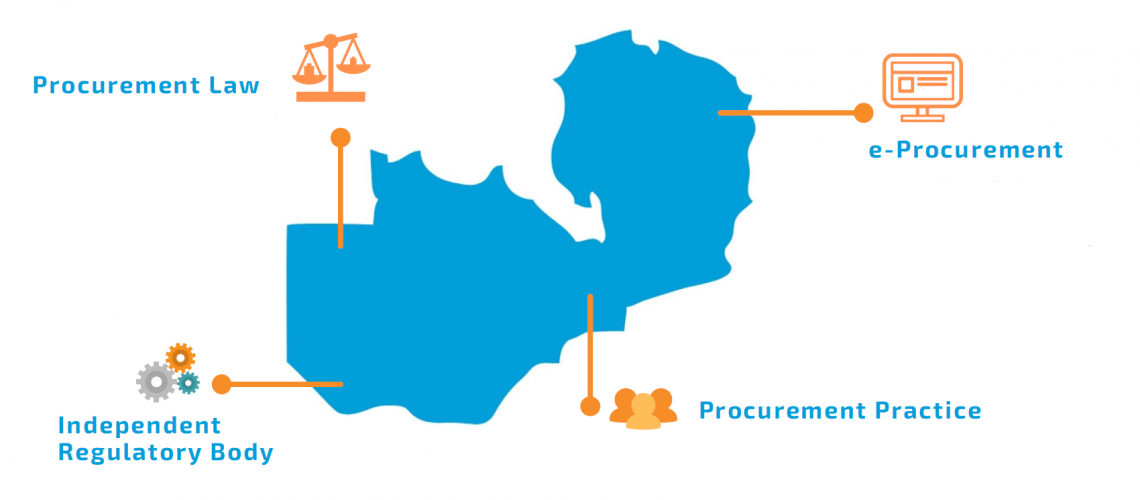Improving Public Procurement in Zambia and How to Get there with MAPS

Public Procurement in Zambia
Zambia underwent an impressive decade-long economic growth period from 2004 to 2014. Today, it is considered a stable country with successful democratic elections every five years. Despite these successes, Zambia has some of the highest levels of inequality in the World with high public expenditure arrears and domestic borrowing levels. What can improvements to Zambia’s public procurement systems do to reduce inequality and boost the economy?
Zambia’s current environment of non-inclusive growth and high spending provided incentives to pursue procurement reforms that would save costs and drive consistent growth. The globally recognized assessment tool, MAPS (Methodology for Assessing Procurement Systems), is instrumental in helping determine what reforms are needed.
In 2018, the Government of Zambia requested the World Bank’s support in carrying out the assessment, which was subsequently carried out by the World Bank’s Procurement team with extensive input and collaboration with Zambia Public Procurement Authority (ZPPA) and other government institutions. The activity is supported by the Global Procurement Partnership Multi-Donor Trust Fund (GPP MDTF), a Bank-administered fund for supporting public procurement reforms at the global and country levels.
The MAPS Report showed alignments with the conclusions drawn from the World Bank’s 2018 Systematic Country Diagnostic for Zambia. The country has been successful in adopting best practices established by developed countries, such as laws, policies, systems, and structures. However, the capacity and performance of public institutions need further support. Zambia has an Anti-Corruption Commission that, in practice, mirrors its international counterparts but has had a limited impact on the perceptions of public funds abuses. The government has updated procurement legislation and oversight laws and structures, but these laws have not been able to guarantee transparency and efficient transactions.
Further, the MAPS report asserts that Zambia’s public procurement system could benefit from further transparency, inclusiveness, prevention, and enforcement. By reducing barriers and constraints for foreign competition and the private sector to compete for government tenders. An open procurement system will drive competition and will promote better value-for-money and higher quality goods and services.
By adopting an e-government system that is mandatory for everyone to use, the digital procurement system will enable the government to save significant time and resources, reduce corruption with improving transparency, open markets to international competition, and encourage the growth of local and small firms since procedures and information will be accessible to everyone. The assessment goes on to provide specific recommendations, such as refocusing the role of the ZPPA on more strategic tasks of regulation, development, and monitoring. Other examples include greater enforcement against fraud and corruption, as well as professional skills development for the procurement workforce.
The report also defines key overarching recommendations to the government on how to strengthen the procurement system:
Zambia MAPS Report Recommendations
- Revise the current draft Public Procurement Bill 2017, which should address the gaps and weaknesses identified in the MAPS assessment
- Expedite the full roll-out of e-GP and make it mandatory for all procuring entities
- Improve transparency measures for contract awards that involve “international relations” before these contracts are signed
- Promote strong leadership and commitment to reform, as well as effective coordination among all stakeholders to build a coalition for good governance
The government sought the assessment due to the timeliness. The Zambian Public Procurement Authority is in the process of revising the legal framework governing public procurement in the country. The current environment and different factors are conducive for reform and Zambian government has demonstrated the will to make improvements in its procurement system.
The recommendations from this MAPS Assessment can help the Zambian government make more informed decisions on their next steps to reforming their procurement system. With the most prudent reforms, Zambia’s public procurement system has the potential to significantly reduce costs and promote savings as well as economic growth to help the country meet its sustainable development goals.
To know more about the MAPS assessment and recommendations see this visual.
Editor's note: The GPP MDTF is implemented with contributions from the Agence Française de Développement, European Commission, Minister of Foreign Affairs of the Netherlands, and Swiss State Secretariat for Economic Affairs.
Contact: GPP MDTF Secretariat: GPPMDTF@worldbank.org
